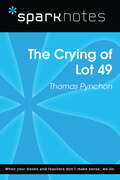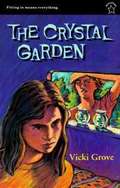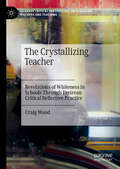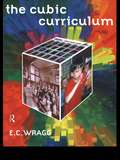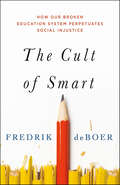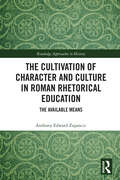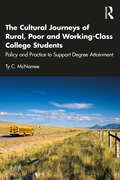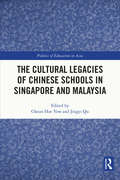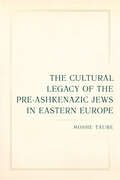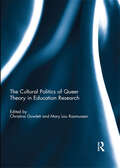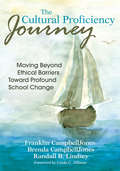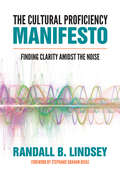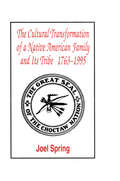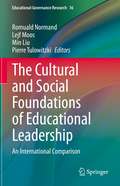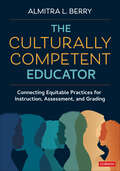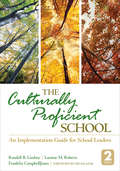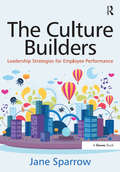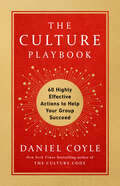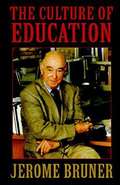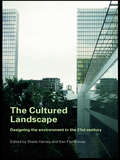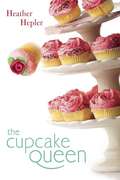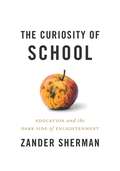- Table View
- List View
The Crying of Lot 49 (SparkNotes Literature Guide Series)
by SparkNotesThe Crying of Lot 49 (SparkNotes Literature Guide) by Thomas Pynchon Making the reading experience fun! Created by Harvard students for students everywhere, SparkNotes is a new breed of study guide: smarter, better, faster.Geared to what today's students need to know, SparkNotes provides:chapter-by-chapter analysis explanations of key themes, motifs, and symbols a review quiz and essay topics Lively and accessible, these guides are perfect for late-night studying and writing papers.
The Crystal Garden
by Vicki Grove[From the back cover:] "Isn't being friends with the right people the most important part of junior high? Eliza wants life in her new town to be different. No one knows what she was like before she came, so if she acts like the popular kids maybe she'll make herself fit in. But the first friend she makes is her neighbor Dierdre, a loner whose family has even more problems than Eliza's. Then school starts and Eliza's plan begins to work. As she gets noticed by Amanda, Casey and Lauren, she leaves Dierdre behind. Now that Eliza finally has what she wants, is she willing to give it all up when tragedy strikes and Dierdre really needs her?"
The Crystallizing Teacher: Revelations of Whiteness in Schools Through Freirean Critical Reflective Practice (Palgrave Critical Perspectives on Schooling, Teachers and Teaching)
by Craig WoodThis book advocates for teacher professional development done differently. The author introduces a process described as ‘crystallizing conscientização’, which restores agency to teachers. Looking beyond incremental improvements in teacher micro-skills promoted by neo-managerial approaches to professional development, the book considers the wider impact of teachers’ personal, professional and political identities on their work. This critical reflective practice combines crystallization as method with Freirean principles of conscientização, asking questions that reveal the impact of whiteness in schools and the role that education performs in replicating whiteness and perpetuating injustice. The book will appeal to academics in the diverse fields of sociology of education, critical race theory, critical whiteness studies, curriculum and pedagogy and teachers’ work, as well as providers of initial teacher education programs and pre-service teachers.
The Cubic Curriculum
by Ted WraggTed Wragg offers a novel and highly imaginative view of the school curriculum, using a unique three-dimensional model.
The Cult of Smart: How Our Broken Education System Perpetuates Social Injustice
by Fredrik deBoerNamed one of Vulture’s Top 10 Best Books of 2020!Leftist firebrand Fredrik deBoer exposes the lie at the heart of our educational system and demands top-to-bottom reform.Everyone agrees that education is the key to creating a more just and equal world, and that our schools are broken and failing. Proposed reforms variously target incompetent teachers, corrupt union practices, or outdated curricula, but no one acknowledges a scientifically-proven fact that we all understand intuitively: Academic potential varies between individuals, and cannot be dramatically improved. In The Cult of Smart, educator and outspoken leftist Fredrik deBoer exposes this omission as the central flaw of our entire society, which has created and perpetuated an unjust class structure based on intellectual ability.Since cognitive talent varies from person to person, our education system can never create equal opportunity for all. Instead, it teaches our children that hierarchy and competition are natural, and that human value should be based on intelligence. These ideas are counter to everything that the left believes, but until they acknowledge the existence of individual cognitive differences, progressives remain complicit in keeping the status quo in place.This passionate, voice-driven manifesto demands that we embrace a new goal for education: equality of outcomes. We must create a world that has a place for everyone, not just the academically talented. But we’ll never achieve this dream until the Cult of Smart is destroyed.
The Cultivation of Character and Culture in Roman Rhetorical Education: The Available Means (Routledge Approaches to History)
by Anthony Edward ZupancicAt its very center, The Cultivation of Character and Culture in Roman Rhetorical Education: The Available Means is a study of the subtle, organic ways that rhetoric can work to cultivate a particular character. This is an extension of the current work in composition studies, which focus on the ways that writing instruction contributes to the development of individual power and agency in students, combined with an ancient understanding of the ways that students learned to act within a particular, accepted cultural framework. It recognizes and reclaims a lost dimension of rhetoric, a dimension that is conceptually linked to the martial culture of the ancient world, to show how ancient rhetorical theory framed the discipline as an education in thinking, speaking, and acting in ways that were necessary to be both a persuasive speaker and an effective leader. Through close readings and analysis of particular rhetorical exercises, the book shows how rhetorical education shaped characters that were appropriate in the eyes of the dominant culture but were also capable of working independently to progressively alter that culture. In showing the ways that rhetorical education shaped a particular character, the book demonstrates the ways that the combination character, culture, and virtue are vital to leadership in any time.
The Cultural Journeys of Rural, Poor and Working-Class College Students: Policy and Practice to Support Degree Attainment
by Ty C. McNameeWith the goal of improving efforts and initiatives to promote college completion, this book offers an engaging, in-depth analysis of the cultural journeys of rural, poor and working-class college students. By examining select student stories through the lens of cultural flexibility, cultural integration, and cultural capital and wealth, the author derives a collective understanding of how these students navigate their college experiences, informing key recommendations for practice and policy. This volume will be of interest to higher education researchers and scholars studying rurality, social class, equity, and college success and completion, as well as practitioners and policymakers looking to more effectively enroll and retain rural, poor and working-class college students.
The Cultural Legacies of Chinese Schools in Singapore and Malaysia (Politics of Education in Asia)
by Cheun Hoe Yow Jingyi QuThis edited volume examines the historical development of Chinese-medium schools from the British colonial era to recent decades of divergent development after the 1965 separation of Singapore and Malaysia. Educational institutions have been a crucial state apparatus in shaping the cultural identity and ideology of ethnic Chinese in Singapore and Malaysia. This volume applies various perspectives from education theory to heritage studies in dealing with the cultural legacy and memory of such schools as situated in larger contexts of society. The book offers comprehensive practice-based analysis and reflection about the complex relationships between language acquisition, identity construction, and state formation from socio-political-cultural perspectives. It covers a broad range of aspects from identities of culture, gender, and religion, to the roles played by the state and the community in various aspects of education such as textbooks, cultural activities, and adult education, as well as the representation of culture in Chinese schools through cultural memory and literature. The readership includes academics, students and members of the public interested in the history and society of the Chinese diaspora, especially in South East Asia. This also appeals to scholars interested in a bilingual or multilingual outlook in education as well as diasporic studies.
The Cultural Legacy of the Pre-Ashkenazic Jews in Eastern Europe (Taubman Lectures in Jewish Studies #8)
by Moshe TaubeA free ebook version of this title is available through Luminos, University of California Press’s Open Access publishing program. Visit www.luminosoa.org to learn more. This book uncovers cultural traces of the ancient Jewry of Eastern Europe from the 10th to 15th centuries. These traces take the form of translations from Hebrew into East Slavic, ranging from accounts of Old Testament prophets and other historical figures of interest to both Jews and Christians, such as Alexander the Great, to scientific and philosophical texts on everything from astronomy to physiognomy to metaphysics. Moshe Taube’s fine-grained analysis teases out a robust picture of this massive cultural enterprise: the translators, their erudition, their biases, and their collaborative method of translation with neighboring Christians. Summarizing over thirty years of philological and linguistic research, this book offers a substantial original contribution to the cultural history of Jews in Eastern Europe and their interaction with, and influence on, Slavic culture in the Middle Ages and Early Modern period.
The Cultural Politics of Queer Theory in Education Research
by Christina Gowlett and Mary Lou RasmussenThe Cultural Politics of Queer Theory in Education Research represents the editors’ intention to disrupt cycles of thinking about the place of queer theory in educational research. The book aims to encourage dialogue about the objects and subjects of queer research, the forms of politics incited by the use of queer theory in education, and the methodological approaches used by scholars when queer(y)ing. The contributions to this book come from those who find queer theory problematic, as well as from those who continue to see a productive place for queer research in education, however that may be defined. The editors have collected contributions that attend to the boundaries that are placed around queer research in education by researchers themselves, and by peers, ethics committees, funding bodies and university and government bureaucracies. Considering how key researchers in gender and education identify with, or deliberately distance themselves from, queer theory, this collection grapples with the contemporary cultural politics of doing queer theoretical work in different education spaces and places. In short, it seeks to disrupt what people think they already know about the ‘place’ of queer theory in education. This book was originally published as a special issue of Discourse: Studies in the Cultural Politics of Education.
The Cultural Proficiency Journey: Moving Beyond Ethical Barriers Toward Profound School Change
by Randall B. Lindsey Dr Franklin L. Campbelljones Brenda CampbelljonesBecause equitable education for every child is a moral imperative! Providing an excellent education to every child is truly a moral imperative, requiring profound change by organizations and individuals. Recognizing that true change begins from within, this compelling book shows how educators can develop a deeper personal understanding of cultural difference and advocate for equitable learning in their classrooms, schools, and districts. Readers will find: An approach to cultural proficiency as a framework for moral action that is grounded in leading thought on ethics and organizational development Reflective exercises for individual study, group learning, and collaborative work Richly detailed case studies that present challenging dilemmas for critical self-reflection and group discussions
The Cultural Proficiency Manifesto: Finding Clarity Amidst the Noise
by Randall B. LindseyA call-to-arms for educators in tumultuous times In times of social disruption and uncertainty, we must return to our core values and remember why we entered education in the first place: to make a difference in the lives of all children. Cultural Proficiency can provide us with essential tools for acting on the promise of American public schooling. The Cultural Proficiency Manifesto places today’s political divisiveness in the context of greater historical change and provides a roadmap to interrupting the cycle of hostility towards marginalized groups. Readers will find: • Esteemed author Randall Lindsey’s latest thinking on Cultural Proficiency • A deliberately brief format that unpacks the Cultural Proficiency Framework and offers practical guidance • Tools and guiding principles to help educators move their school community toward inclusivity • Prompts for individual reflection and team dialogue Now more than ever, our students need educators to uphold our commitment to social justice, equity, and inclusion for all. "Lindsey′s manifesto is a call to action for educators to ensure we are creating culturally responsive environments to support all learners. It teaches us how to authentically engage in the work of educating our wonderfully diverse population." —Julie A. Vitale, Superintendent Romoland School District, CA "This manifesto is indeed timely and essential. Dr. Lindsey′s vast experience as an expert and leader in cultural proficiency reminds us that now is the time to acknowledge and address the vast number of diversity, equity, and social justice issues at hand." —Kenneth R. Magdaleno, Executive Director Center for Leadership, Equity, and Research
The Cultural Proficiency Manifesto: Finding Clarity Amidst the Noise
by Randall B. LindseyA call-to-arms for educators in tumultuous times In times of social disruption and uncertainty, we must return to our core values and remember why we entered education in the first place: to make a difference in the lives of all children. Cultural Proficiency can provide us with essential tools for acting on the promise of American public schooling. The Cultural Proficiency Manifesto places today’s political divisiveness in the context of greater historical change and provides a roadmap to interrupting the cycle of hostility towards marginalized groups. Readers will find: • Esteemed author Randall Lindsey’s latest thinking on Cultural Proficiency • A deliberately brief format that unpacks the Cultural Proficiency Framework and offers practical guidance • Tools and guiding principles to help educators move their school community toward inclusivity • Prompts for individual reflection and team dialogue Now more than ever, our students need educators to uphold our commitment to social justice, equity, and inclusion for all. "Lindsey′s manifesto is a call to action for educators to ensure we are creating culturally responsive environments to support all learners. It teaches us how to authentically engage in the work of educating our wonderfully diverse population." —Julie A. Vitale, Superintendent Romoland School District, CA "This manifesto is indeed timely and essential. Dr. Lindsey′s vast experience as an expert and leader in cultural proficiency reminds us that now is the time to acknowledge and address the vast number of diversity, equity, and social justice issues at hand." —Kenneth R. Magdaleno, Executive Director Center for Leadership, Equity, and Research
The Cultural Revolution at the Margins
by Yiching WuMao Zedong envisioned a great struggle to "wreak havoc under the heaven" when he launched the Cultural Revolution in 1966. But as radicalized Chinese youth rose up against Party officials, events quickly slipped from the government's grasp, and rebellion took on a life of its own. Turmoil became a reality in a way the Great Leader had not foreseen. The Cultural Revolution at the Margins recaptures these formative moments from the perspective of the disenfranchised and disobedient rebels Mao unleashed and later betrayed. The Cultural Revolution began as a "revolution from above," and Mao had only a tenuous relationship with the Red Guard students and workers who responded to his call. Yet it was these young rebels at the grassroots who advanced the Cultural Revolution's more radical possibilities, Yiching Wu argues, and who not only acted for themselves but also transgressed Maoism by critically reflecting on broader issues concerning Chinese socialism. As China's state machinery broke down and the institutional foundations of the PRC were threatened, Mao resolved to suppress the crisis. Leaving out in the cold the very activists who had taken its transformative promise seriously, the Cultural Revolution devoured its children and exhausted its political energy. The mass demobilizations of 1968-69, Wu shows, were the starting point of a series of crisis-coping maneuvers to contain and neutralize dissent, producing immense changes in Chinese society a decade later.
The Cultural Transformation of A Native American Family and Its Tribe 1763-1995: A Basket of Apples (Sociocultural, Political, and Historical Studies in Education)
by Joel SpringThis book describes the impact of U.S. government civilization and education policies on a Native American family and its tribe from 1763 to 1995. While engaged in a personal quest for his family's roots in Choctaw tribal history, the author discovered a direct relationship between educational policies and their impact on his family and tribe. Combining personal narrative with traditional historical methodology, the author details how federal education policies concentrated power in a tribal elite that controlled its own school system in which students were segregated by social class and race. The book begins with the cultural differences that existed between Native Americans and European colonists. The civilization policies discussed begin in the 1790s when both Presidents George Washington and Thomas Jefferson searched for a means of gaining the lands occupied by the southern tribes, including the Choctaws. The story involves a complicated interaction between government policies, the agenda of white educators, and the desires of Native Americans. In a broader context, it is a study of the evolution of an American family from the extended support of the community and clan of the past, to the present world of single parents adrift without community or family safety nets.
The Cultural and Social Foundations of Educational Leadership: An International Comparison (Educational Governance Research #16)
by Romuald Normand Lejf Moos Min Liu Pierre TulowitzkiThis book identifies the cultural and moral foundations of country-specific educational governance and school leadership and presents the principles of justice and the diversity of common goods that guide leadership practices in schools. It contributes to an existing research field that studies diversity and ethical leadership in schools. The social dimension of school leadership is not limited to issues related to equality and equity, or social inclusion. The capacity of leaders to promote civic-mindedness and social cooperation, consensus and acceptance of others, the right balance between freedom and duties, and reciprocity of obligations, are essential to maintain democratic rights and facilitate the life together while respecting ethnic and cultural differences. Therefore, the book gathers contributions from a range of international authors capable of reporting these moral and cultural features, while broadening the research perspectives on school leadership.
The Culturally Competent Educator: Connecting Equitable Practices for Instruction, Assessment, and Grading
by Almitra L BerryActionable strategies to support the strengths of every learner In The Culturally Competent Educator, Dr. Almitra L. Berry draws on more than three decades of experience to offer educators a roadmap to implementing equitable practices and policies. Rooted in research and practical advice, this book helps educators foster an environment where every student feels valued and respected. By exploring culturally and linguistically affirming approaches to instruction, assessment, and grading, readers will be empowered to break down barriers to student learning and achievement. Key features include Clear explanations of key equity indicators and concepts Practical examples and classroom lesson plans Strategies for improving instructional materials and developing media literacy Tools for self-assessment and reflection Dr. Berry′s guide emphasizes the importance of engaging in professional learning communities for deeper understanding and support. By working through this book, educators can become equity warriors, transforming their classrooms into places where all students can thrive socially, behaviorally, and academically. This is a must-read for educators, administrators, and anyone committed to creating a more just and inclusive educational environment.
The Culturally Competent Educator: Connecting Equitable Practices for Instruction, Assessment, and Grading
by Almitra L BerryActionable strategies to support the strengths of every learner In The Culturally Competent Educator, Dr. Almitra L. Berry draws on more than three decades of experience to offer educators a roadmap to implementing equitable practices and policies. Rooted in research and practical advice, this book helps educators foster an environment where every student feels valued and respected. By exploring culturally and linguistically affirming approaches to instruction, assessment, and grading, readers will be empowered to break down barriers to student learning and achievement. Key features include Clear explanations of key equity indicators and concepts Practical examples and classroom lesson plans Strategies for improving instructional materials and developing media literacy Tools for self-assessment and reflection Dr. Berry′s guide emphasizes the importance of engaging in professional learning communities for deeper understanding and support. By working through this book, educators can become equity warriors, transforming their classrooms into places where all students can thrive socially, behaviorally, and academically. This is a must-read for educators, administrators, and anyone committed to creating a more just and inclusive educational environment.
The Culturally Proficient School: An Implementation Guide for School Leaders
by Randall B. Lindsey Dr Franklin L. Campbelljones Laraine M. RobertsThe groundbreaking guide to cultural proficiency in schools, updated to meet today’s challenges This fully updated second edition of The Culturally Proficient School—likely the most influential book yet on improving the learning experience by valuing diversity and cultural dignity— is more relevant, accessible and effective than ever. Incorporating up-to-date research and reader feedback, the new content includes: Instructive vignettes that reflect contemporary truths about educational diversity and moral leadership Emphasis on skills development, including the art and science of conversation A conceptual framework that leaves no doubt about the first steps to take towards a more culturally proficient school
The Culture Builders: Leadership Strategies for Employee Performance
by Jane SparrowAs with many people-oriented initiatives, employee engagement remains an emerging science with as many advocates as detractors. In The Culture Builders Jane Sparrow shares the insight of her research and experience into how companies are creating an engaged workforce. Along the way she looks at the evidence, the case for engagement and how organizations are measuring and defining it. Having an engagement strategy is merely a first step and so the book explores how to enable the manager-as-engager. Alongside the practical models and the guidance, there are stories and examples from leaders and organizations allowing you to learn, amongst other things, about the strong sense of purpose felt in John Lewis Partnership; the importance Innocence places on values; how Sony has used visual metaphors to give context and strategic direction and how MGM Resorts targets engagement strategies to the needs of specific employee groups. The need for sustained employee performance has been put into sharp focus in recent years. The Culture Builders is a book that provides the theory and practice to connect employee engagement to long-term performance. Simply reading it won’t guarantee that performance. Reading it, learning and applying the lessons it offers, will dramatically improve your chances.
The Culture Playbook: 60 Highly Effective Actions to Help Your Group Succeed
by Daniel CoyleThe ultimate handbook for fostering and cultivating a strong team culture, from the New York Times bestselling author of The Culture Code and The Talent Code.&“If you are a leader—or if you work with one—and want to understand how to build psychological safety, trust, and a sense of purpose for your team, then you need this book.&”—Charles Duhigg, author of The Power of HabitBuilding a team has never been harder than it is right now. How do you create connection and trust? How do you stay focused on your goals? In his years studying the ways successful groups work together, Daniel Coyle has spent time with elite teams around the world, observing the ways they support each other, manage conflict, and move toward a common goal. In The Culture Playbook, he distills everything he has learned into sixty concrete, actionable tips and exercises that will help your team build a cohesive, positive culture. Great cultures, Coyle has found, are built on three essential skills: safety, vulnerability, and purpose. Within this framework, he shows us how we can better serve our teammates, ourselves, and our shared purpose, including:• scheduling regular team &“tune-ups&” to place an explicit spotlight on the team&’s inner workings and create conversations that surface and improve team dynamics• creating spaces for remote coworkers to connect with their colleagues to foster a team spirit even across distances • holding an anxiety party to serve as a pressure-relief valve, as well as a platform for people to connect and solve problems together With reflections, exercises, and practical tips that will prove invaluable to companies, athletes, and families alike, and replete with black-and-white illustrations, The Culture Playbook is an indispensable guide to ensuring that your team performs at its best.
The Culture of Education
by Jerome BrunerThis is a book of essays about education. In this commentary on the possibilities of education, eminent psychologist Jerome Bruner explains how education can usher children into their culture, though it often fails to do so. Bruner explores new and rich ways of approaching many of the classical problems that perplex educators.
The Cultured Landscape: Designing the Environment in the 21st Century
by Ken Fieldhouse Sheila HarveyThis book poses important philosophical questions about the aims, values and purposes of landscape architecture. The editors, highly regarded in their field, have drawn together a distinguished team of writers who provide unique individual perspectives on contemporary themes from a wide base of knowledge. Altogether, this key international study raises awareness of the landscape and encourages innovative ways of thinking about quality in design.
The Cupcake Queen
by Heather HeplerWhen her mother moves them from the city to a small town to open up a cupcake bakery, Penny's life isn't what she expected. Her father has stayed behind, and Mom isn't talking about what the future holds for their family. And then there's Charity, the girl who plays mean pranks almost daily. There are also bright spots in Hog's Hollow -- like Tally, an expert in Rock Paper Scissors, and Marcus, the boy who is always running on the beach. But just when it looks as though Penny is settling in, her parents ask her to make a choice that will turn everything upside down again. A sweet novel about love, creativity, and accepting life's unexpected turns.
The Curiosity of School
by Zander ShermanIt¿s one thing we all have in common. We¿ve all been to school. But as Zander Sherman shows in this fascinating, often shocking account of institutionalized education, sending your kids off to school was not always normal. In fact, school is a very recent invention. Taking the reader back to 19th-century Prussia, where generals, worried about soldiers¿ troubling individuality, sought a way to standardize every young man of military age, through to the most controversial debates about the topic of education today, Sherman tells the often astonishing stories of the men and women¿and corporations¿that have defined what we have come to think of as both the privilege and the responsibility of being educated. With clarity, detachment, and wry humour, Sherman presents the story of school through the stories of its most influential¿and peculiar¿reformers. We learn that Montessori schools were embraced by Mussolini's Italy, that the founder of Ryerson University was a champion of the Canadian residential school system (for which the government apologized a century and a half later), and that Harvard was once a byword for mediocrity. Along the way, we discover that the SAT was invented as an intelligence test designed to allow the state to sterilize ¿imbeciles¿ and in its current state is perhaps equally pernicious, that suicide in the wake of disappointing results in the state university placement exams is the fifth leading cause of death in China, and that commercialized higher education seduces students into debt as cynically as credit card companies do.
